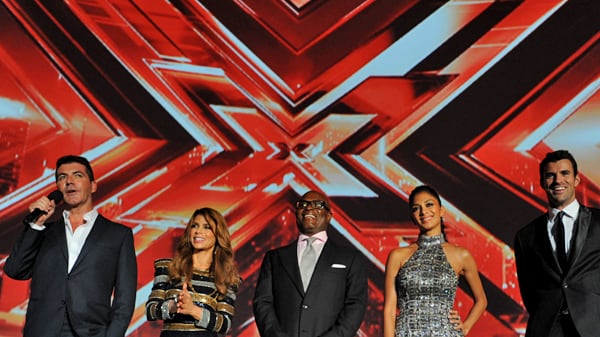A couple of weeks ago, X Factor viewers saw what might have been the most incredible elimination episode in the now-extensive history of TV talent competitions. Facing elimination, Astro—the show's 15-year-old Brooklyn rapper—initially refused to perform in the sing-off that would determine who goes home, not wanting to honor the fools in the audience who had failed to see the brilliance of his work. Across the stage, Stacy Francis, the show’s controversy-ridden 42-year-old superdiva, glared daggers of hate at the judges, whose harsh commentary had put her in this position. She would, ultimately, after receiving the boot, lambaste her judge-mentor Nicole Scherzinger for the poor guidance that had destroyed her chances, voicing the opinion that had she been guided by someone else she would still be singing.
"It was a car-crash moment," X Factor auteur Simon Cowell said about Astro’s defiance in a conversation after last week's show. "But I kind of like that. When it was happening, I was annoyed that Astro was going to blow his chance because of a stupid thing, but then I watched it back and thought, ‘Well, that's how a 15-year-old from a tough background would react to getting that kind of rejection for the first time.' It was kind of brilliant."
The moment was rude, inappropriate, harsh—and thrilling drama, miles away from the all-smiles “I’m just so grateful for the opportunity” automaton demeanor that dominates other competitions.
The X Factor is not for everybody. American Idol is for everybody, and still, despite the assault from Simon Cowell and Mark Burnett’s The Voice, holds the ratings crown to prove it, with numbers from last season approximately double what either of the upstarts pulls in. The vast, aging middle apparently still prefers its singers humble, its judges supportive and verklempt, its stories tearjerking, and its singing styles 20 to 30 years behind today’s charts. It’s a formula with a thoroughly proven track record. It is the champion of today and yesterday, and one whose uplifting message speaks well for its fans. However, it is a format that has often felt like a throwback to the golden age of variety TV rather than staying relevant to the culture of today.
"Network TV was in real danger of going into a death spiral and not having young audiences," Cowell said of the pre–X Factor landscape. "This show depends on having a young audience own it."

For years, critics have complained about the stodginess of Idol, mocking its Whitney Houston–centric, schmaltzy, tearjerky style, but thus far few of the pundit class have taken notice that their prayers have been answered. With X Factor, Cowell has done the seemingly impossible. A decade after American Idol debuted and went on to make talent competitions TV’s most overworked genre, Cowell has created a new one that feels not only fresh but relevant. It is not just a pageant living in a parallel world apart from the contemporary convolutions of music and entertainment, but a vital organism that could actually, as Idol once did, lead the culture in new directions. And compared with the pious tone of other shows, X Factor is edgy, irreverent, and a whole lot of fun.
Among the major differences between X Factor and the rest of the field:
Singers
Of the 10 singers and three groups who made it to the X Factor finals, only four (Astro, Chris Rene, Marcus Canty, and Melanie Amaro) would have been eligible for American Idol. The rest are either groups, which are not part of the Idol mix, or too young or too old to be eligible for the singing-contest titan. Of the four who are eligible, the three males performed in rap and hip-hop styles that have never been granted a place on the Idol main stage. Of all the X Factor contestants, only chanteuse Melanie Amaro, a 19-year-old mistress of the giant-note ballad, might have made an Idol contender. What Idol would have missed is striking: from Taylor Swift–inspired pixie girl Drew Ryniewicz to the hip-hop team styles of the Stereo Hoggs to the soulful hard-rock crooning of Josh Krajcik.
Further, taking one look at a group portrait of the X Factor finalists and comparing it with any recent Idol season shows you at one glance the difference between the two shows. To put it plainly, one is heavily dominated by Anglo faces and the other looks far more like the mix of people who dominate the current music charts. In particular, for the past four years, Idol has been dominated by a dynasty of cute white boys who seem to have a lock on the crown. No nonwhite singer has made it to the Idol finale in four years. No African-American male has made it farther than fourth place in eight years.
Whoever the X Factor’s champion turns out to be, he won’t be a cute young white male, since none are left in the competition. In fact, not one made it into X Factor’s Top 13. While critics have complained that Idol has begun to sound like a late-‘80s nostalgia tour, an episode of The X Factor, which will typically feature everything from hip-hop to tween confessionals, sounds utterly of the moment. It takes only a baby step of the imagination to see one of the contestants commanding the pop charts, compared with the giant leap of faith required to believe in the prospects for the pageant bots.
And amazingly, the contestants on X Factor behave like actual human beings. They talk back. They act selfish. They get angry. Just like real people. And very unlike the highly coached, gratitude-infused Idol stars.
"I want the public to see how they are," Cowell said. "I've hated the contestants I've seen in the past who are nice on camera but then vile to the crew when the cameras are off. But many singers are divas and do have huge egos and can be very difficult. That's the reality of the music world, and I wanted audiences to see that."
If you want your singers grateful, bland, and forever inoffensive, this is not the show for you.
Judges
This past season, American Idol made the decision to break with its Cowell-driven past and go all-in on supportive and nurturing. The result was a show as rich in drama as a scoreless sixth-grade soccer game where everybody wins.
On X Factor, it is not only that the judges are nastier to each other than competition judges have ever been (they are). But more, they have something to say beyond “That was beautiful.” In Simon Cowell and L.A. Reid in particular, you have two judges who have very strong opinions and are incredibly articulate in expressing them. With Reid, the show has a judge with an unimpeachable record of producing hits, which has made him the first judge who can truly hold his own against Cowell. Their quarrels have been vicious and delightful, but, again, not only because they are mean, but because they are passionately debating what makes a pop singer work, which is, after all, supposedly the question mark at the very core of these shows.
Further, the recasting of the judges as mentors to the contestants makes it possible for them to direct their harshest barbs at each other's guidance rather than at the hapless singers themselves. A redirection that allows the show to be paradoxically more vicious and more humane.
Production
Slicker, faster-paced than Idol and other talent shows, X Factor’s tone is darker than the competition; it hits heavy on the high stakes and drama, lighter on the sob stories and feel-good moments. It feels like a modern television entertainment program. The stage, for instance, might well be the largest wall of pure video screens ever constructed for television. "I wanted a show that felt like the numbers you see on awards shows or for big events," Cowell said, telling of how he pushed in its original U.K. version for ever-bigger budgets to turn the show into a true spectacle. "Every year I pushed ITV for more money."
The result is a weekly display of some breathtaking visual effects surrounding the singers, whose numbers, complete with costumes and backup dancers, create an effect that feels like a big-budget arena concert from top to bottom.
Rules
If there is one thing Idol has proved, it is that too much democracy is not necessarily a good thing. Particularly in the hands of tweenage girls. We know how that has worked out on Idol of late. X Factor has managed to preserve most of the genre’s democratic institutions while putting a brake on unquestioned mob rule. Each week, the audience still votes for the bottom two, but the judges then step in and decide which of the lowest vote getters should go home. Consequently, some of the very best acts are spared the will of the masses for a bit, as was the case when the brilliant Stereo Hoggs were granted an extra lease on life.
The Future
X Factor's debut season may not have knocked Idol off its ratings pedestal, but with it averaging 11 million viewers a week, the numbers are solid. Led by X Factor, the Fox network won its first November sweeps with the critical 18- to 49-year-old demographic.
It may be attracting a smaller crowd, but it’s the audience that is looking ahead. Like the Soviet Union in Ninotchka, Simon Cowell’s X Factor audience has fewer but better Russians.






